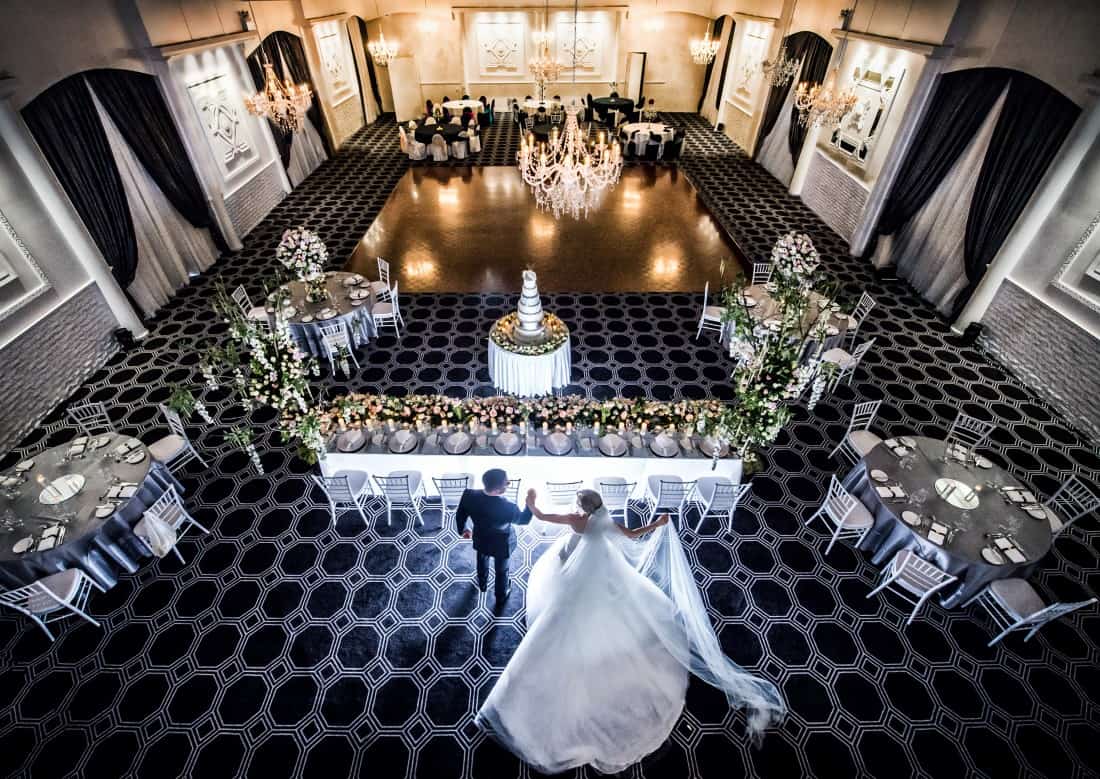Being involved in wedding planning may be stressful. But it’s possible to keep the stress at bay with the right strategies. To avoid feeling overwhelmed, start by setting realistic expectations and a manageable timeline, allowing yourself ample time to make decisions without pressure.
Prioritise self-care, take regular breaks to relax and recharge, and not be afraid to Give responsibilities to dependable family members, friends, or a wedding planner. Staying organised with checklists and clear communication with your partner and vendors can prevent last-minute surprises, making the process more enjoyable and less stressful.
Let’s Get Straight to the Point
Planning a wedding can be stressful, but setting realistic timelines, prioritising tasks, and practising self-care allow you to manage the process smoothly. Start by organising your plans early, delegating tasks to trusted individuals, and maintaining open communication with your partner and family.
Be mindful of your budget, prioritise what matters most, and remain flexible. Managing anxiety is crucial—practice mindfulness, avoid social media comparisons, and seek support when needed.
On the wedding day, focus on enjoying the moment rather than striving for perfection. Post-wedding, reflect, preserve memories, and shift your focus to building a strong marriage. Remember, the most important aspect of your wedding is celebrating your love and commitment, not the perfection of every detail.
Managing Wedding Planning Anxiety
Wedding planning can sometimes trigger anxiety, especially when things don’t go as expected. Recognising these feelings and taking proactive steps to manage them effectively is essential.
Acknowledge Your Anxiety
- Accept Your Feelings: Feeling anxious about such a significant event is normal. Acknowledging your emotions is the first step toward managing them effectively.
- Identify Triggers: Try to pinpoint what aspects of wedding planning are causing the most anxiety. Is it the guest list, budget concerns, or family dynamics? Once identified, you can address these issues more effectively.
Practice Mindfulness And Relaxation Techniques
- Incorporate Relaxation Practices: Methods like yoga, meditation, and deep breathing can assist in lowering tension and anxiety. Include these routines in your daily activities to sustain calm during the planning process.
- Take Time for Yourself: Schedule regular “me-time” away from wedding planning. Whether it’s a hobby, a walk in nature, or a relaxing bath, taking breaks helps to reset your mind.
Limit Social Media Influence
- Avoid Comparisons: Social media can often create unrealistic expectations. Avoid comparing your wedding to others you see online, as this can lead to unnecessary stress.
- Curate Your Feed: Follow accounts that inspire positivity and realistic wedding ideas. Unfollow or mute accounts that make you feel pressured or inadequate.
Communicate Openly With Your Partner
- Share Your Concerns: Openly discuss your anxieties with your partner. Wedding planning is a joint effort; sharing your concerns can help you work through challenges together.
- Make Decisions Together: Involve your partner in decision-making to consider your perspectives. This also helps distribute the emotional load, reducing stress for both of you.
Dealing With Family Expectations
Family expectations can add a layer of stress to wedding planning. It is crucial to handle these expectations with care and consideration.
Set Clear Boundaries
- Establish Boundaries Early: Discuss with your family what level of involvement they will have in the wedding planning process. Setting clear boundaries early on helps prevent misunderstandings and conflicts.
- Be Firm Yet Respectful: Being firm about your decisions while respecting your family’s opinions is important. Acknowledge their input, but clarify that you and your partner will make the final decisions.
Involve Them Strategically
- Assign Specific Tasks: If family members want to help, assign tasks matching their strengths and interests. This allows them to contribute meaningfully without overstepping boundaries.
- Keep Communication Open: Regularly update your family on the progress of your plans. Keeping them informed helps them feel included and can lessen the possibility of unexpected last-minute events or objections.
Creating A Realistic Wedding Vision
Crafting a wedding that reflects your true vision requires balancing dreams with practicality. Here’s how to approach this aspect of planning.
Define Your Priorities
- Identify What Matters Most: Sit down with your partner and list the top three to five elements most important to you. This could be the venue, food, music, or photography. Focusing on these priorities will guide your decisions.
- Stay True to Your Vision: Getting caught up in trends or what others think you should do is easy. Stay true to your vision and create a wedding that reflects your unique relationship and values.
Budget Realistically
- Be Honest About Your Finances: Create a budget reflecting your financial situation. Avoid debt for your wedding by sticking to what you can afford.
- Allocate Funds Wisely: Once you’ve identified your priorities, allocate your budget accordingly. Spend more time on the elements that matter most to you and find creative ways to save on others.
Be Flexible And Open To Compromise
- Expect the Unexpected: Understand that not everything will go according to plan, and that’s okay. Flexibility is key to managing unforeseen changes without added stress.
- Compromise Where Necessary: If certain elements of your dream wedding are out of reach, find areas where you can compromise. This could mean adjusting your guest list, choosing a different venue, or simplifying your decor.
The Importance Of Self-Care During Wedding Planning
Preserving your physical and emotional well-being throughout the wedding planning journey is critical. Prioritising self-care ensures you stay happy and healthy before your big day.
Prioritise Your Well-being
- Maintain a Healthy Lifestyle: Eating well, exercising regularly, and obtaining adequate rest are essential for stress management. Make self-care a non-negotiable part of your routine.
- Take Regular Breaks: Don’t let wedding planning consume all your time. Take regular pauses to recover and establish new connections with yourself and your partner.
Avoid Burnout
- Know Your Limits: It’s easy to burn out when planning a wedding. Recognise when you’re feeling overwhelmed and take a step back. It’s okay to delegate or postpone tasks if needed.
- Practice Mindful Activities: Engage in activities that help you relax and stay grounded. Whether reading, painting, or spending time outdoors, find what works for you and make time for it regularly.
Seek Support When Needed
- Lean on Your Support System: Don’t hesitate to ask for help. Support from your partner, friends, or a professional can significantly affect managing stress.
- Consider Professional Help: If anxiety becomes overwhelming, consider talking to a therapist or counsellor. They can provide tools and strategies to help you cope with the pressures of wedding planning.
Post-Wedding: Reflecting And Moving Forward
After the wedding, reflect on the experience and shift your focus to the future. Here’s how to transition smoothly from wedding planning to married life.
Reflect On The Day
- Take Time to Reflect: Reflect on the day with your partner after the wedding. Discuss what went well and laugh about the moments that didn’t go as planned.
- Be Thankful: Express gratitude to those who assisted in making your day special. Acknowledging their support is important, whether a thank-you note or a small gesture.
Preserve Your Memories
- Organise Photos and Keepsakes: Shortly after the wedding, organise your photos, video, and any keepsakes. This helps preserve the memories of your special day for years to come.
- Create a Wedding Album: Consider making a wedding album or a scrapbook. This is a wonderful way to relive the day and share the experience with loved ones in the future.
Focus On Your Marriage
- Shift Focus to Married Life: After the excitement of the wedding, shift your focus to building a strong and healthy marriage. Continue to nurture your relationship and communicate openly with your partner.
- Set Future Goals Together: Start discussing your goals as a married couple. Whether planning a honeymoon, buying a home, or starting a family, setting goals together helps strengthen your bond.
Wedding planning is a unique journey filled with challenges and joys. You can navigate this process gracefully and easily by staying organised, prioritising self-care, and focusing on what truly matters. Keep in mind that celebrating your love and commitment is the ultimate purpose, and no amount of stress can overshadow that.
Your wedding day will be one of the most memorable days of your life, not because everything was perfect, but because it marks the beginning of a new chapter with the person you love. Embrace the journey, enjoy the special moments, and look forward to a bright future together.




